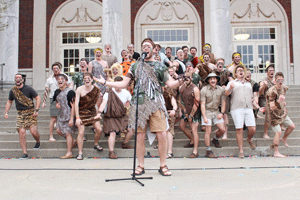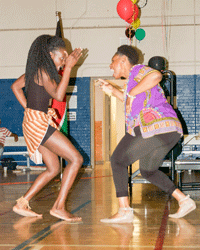Racers look for the distinction between fact and fiction
‘A Night in Africa’ comes to campus
Story by Gisselle Hernandez, Features Editor

Africa has often been a victim of blind ignorance – for example, the assumption that it’s a country and not a continent. Because of misconceptions like these, the African Student Association decided to host “A Night in Africa” – an event showcasing traditional African food, cultural dances, poetry and a fashion show on Friday – in hopes of educating the masses about the “real Africa.”
Bellarmine Ezumah, assistant professor of journalism and mass communications and adviser of the association, described the event’s purpose as changing the mentality of how the mainstream media portrays Africa.
“[In the media, Africa] is usually full of crisis, full of disease, full of poverty and full of corruption,” she said. “An event like this actually showcases Africa for what it really is.”

Students and faculty members were welcome to embrace both traditional and modern dance.
And what Africa really is is beautiful metropolitan cities with talented people, Ezumah said. She said it surprises her that the misconception of Africa being a country and not a continent with many countries still persists today. Events the association puts on, such as “Taste of Africa” or the Miss MSU International pageant, are all efforts to relinquish the concept of Africa being a “wild” wasteland.
David Pizzo, professor of history, said this idea was reflected in Sigma Phi Epsilon’s theme in All Campus Sing, “Welcome to the Jungle.”
Serah Waweru, senior from Kenya and president of the African Student Association, said it means a lot when people want to learn about African culture.
“After events, people will come up to us and tell us ‘we didn’t know that about Africa, I want to go visit Africa,’” she said. “It gives people another perspective.”
Ezumah agrees, saying American students ought to get to know African students and learn about their culture.
“Students will then realize that there is not much difference between you, or an American or a German and someone from Nigeria, Kenya or Ghana,” she said.
“A Night in Africa” is not only for educating others about the “real Africa,” but also helpful in bringing a little taste of home to African students at Murray State, Ezumah said. She said African students could have their self-esteem suffer from culture shock.
“Events like these make them even prouder about who they are and where they come from,” she said. “When you get an opportunity like this to talk about you, to tell your story, to share with people, it makes you even prouder and I think it raises their self-esteem as well.”
Despite the event being hosted by the African students, there were many instances throughout the night where the audience was in the limelight. Dance contests – from African tunes to Africa’s “whip” and “nae nae” – involved volunteers from the audience who were taught a couple of signature African dance moves.
A fashion show, three poems, two dance performances and an African dinner later, “A Night in Africa” ended with Ezumah thanking the attendees and reminding students what Africa actually is.
Don Robertson, vice president of Student Affairs, said events like these reflect what Murray State is all about.
“[These] events allow us to explore the world without ever leaving campus,” he said.
Sig Ep draws criticism at All Campus Sing
Story by Taylor Inman, Staff Writer

The champions of the fraternity division in full “jungle” garb.
The United States has struggled in the past with generalizing places abroad, and with the majority of the population being undereducated and uninformed about it, Africa is no exception.
The issue was brought to the attention of faculty and students after an All Campus Sing performance was said to show stereotypes of Africa by history professor David Pizzo.
The performance was “Welcome to the Jungle” by Sigma Phi Epsilon, who won the fraternity division. The show included songs like “Africa” by Toto and garnered the attention of Pizzo, who teaches Modern Africa. He said he knows the group did not intend for their performance to come off this way, but that their show was a symptom of a much larger problem.
“This is not me saying they are full of hate or that they were meaning to hurt anyone,” Pizzo said. “I think in many ways it was a graphic representation of a whole range of stereotypes, misconceptions and problematic notions of not just Africa, but India was also in the mix.”
Pizzo said that while he thinks that the show was fun and clever, it still ended up being a manifestation of a lot of ideas that people have about Africa being backward and primitive, even when it wasn’t consciously done.
Sig Ep’s All Campus Sing show designer Alex Hopewell said their show wasn’t meant to portray any particular place.
“The entire performance was based around the jungle, it was based around ‘The Jungle Book’ and ‘Tarzan,’” Hopewell said. “No more assumptions were made about it; that was about the extent of our thought process on the theme.”
But Sigma Phi Epsilon President Jacob Baird said that it is possible for these classic children’s movies to also make the same mistake when it comes to portraying Africa and India.
“I think that they can [portray Africa badly], I think that there’s definitely a possibility that some people can connect the two,” Baird said. “These were just movies that we grew up in our childhood that we thought would make for an entertaining show.”
There is even a large divide in the West when it comes to people constantly referring to Africa as one country or place, even though the continent holds 54 countries, making it the continent with the most countries in the world.
The article by The Guardian, “Africa is not a country”, highlighted that there were 5,443 articles between 2012 and 2013 that only used “Africa” to describe the place they were talking about on the continent, instead of using the country’s real name.
Pizzo said making the West aware of African stereotypes comes down to one thing: education.
“Some Americans don’t even know that it’s not a country, and I don’t blame them for this,” Pizzo said. “They don’t talk about Africa in schools, it’s not a core curriculum.”
An event hosted by the African Student Association, “A Night in Africa,” was held last weekend. Bellarmine Ezumah, assistant professor of journalism and mass communications and the adviser of the association, said the event was done precisely to eliminate the ideas about Africa the mainstream media portrays. She also said it is not uncommon for people to still think of Africa as a country and not a continent.
“Africa is not a jungle,” Ezumah said. “It is so much more.”
And when it comes to helping people realize that, Hopewell said a better education is the key.
“Knowledge is power in any circumstance,” Hopewell said. “I think that there is probably a lesser chance of things like this coming to the light if there was a deeper understanding of what true African culture is.”




























































































